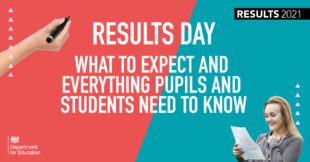
*This post is now out of date. Please visit: GCSE and Level 2 and below VTQ results: Everything you need to know - The Education Hub (blog.gov.uk) and A Level, T Level, and VTQ results: Everything you need to know - The Education Hub (blog.gov.uk) for the latest information.
This year GCSE, A level, and vocational and technical qualification students will receive grades determined by their teachers. There is no one better placed to judge young people’s abilities than their teachers, who see them day-in-day-out.
Students have been assessed only on what they have been taught, not what they may have missed.
As we announced earlier in the year, this approach has been taken to ensure they have the confidence that, despite exams not going ahead this year, students will still receive grades that reflect what they know and can do.
This has been a year unlike any other. However, the progress we’ve made along the roadmap out of the pandemic means many aspects of results days and all that they entail won’t be too different to previous years, although some things have changed.
We answer your questions on results days, what happens next and more.
When will students get their GCSE, A level and vocational and technical qualification results?
Results days are happening earlier this year to give more time for students to prepare for their next steps. They’re also all happening in the same week and not a week apart as they have been in previous years.
A-level students will get their results on Tuesday, 10 August, after 8:30am.
GCSE students will receive their results on Thursday, 12 August, after 8:30am.
Vocational and Technical Qualifications (VTQs), most similar to GCSEs and A levels and used for progression to further or higher education, for example, BTECs, OCR Cambridge Technicals and Core Maths, results will be issued on 10 August for Level 3 qualifications and 12 August for Level 2 qualifications.
How will students receive their results?
Centres will have their own arrangements for releasing results. Students should contact their centre for details.
Will the results themselves be different to other years?
No. GCSE grades will be delivered in the 1-9 format as they have been for the last few years – find out more about that in our piece about how the grading system now works, which includes a graphic that shows how new and old grades compare to one another. The grading systems for A levels and all other qualifications are the same as they’ve always been.
What about next year?
Students studying A levels, GCSEs and other technical and vocational qualifications are expected to sit exams next year, as the best and fairest way to assess their performance.
We recognise the disruption young people have faced in the last 18 months which will still affect pupils sitting those exams. That’s why we’re consulting with students, their parents and their teachers on proposals that will allow exams to take place while making adaptations to take into account the impact of the pandemic.
Find out more about the consultation in our dedicated piece.
What happens once students have received their results?
Once students have received their results, their chosen university, college or apprenticeship provider will be in contact to discuss next steps.
If students don’t get the results they need, there are still several options open to them – further information is available here (Link to piece 4).
For students wanting to go to university, UCAS Track will inform them as soon as updates are received from universities. This means students will be able to go online to see if they have been successful in getting the university place they want. Even if they don't get the grades they need, their preferred university may still offer them a place.
What happens if a student hasn’t got the grades they need for their next steps?
There is a lot of support and help available for anyone who hasn’t got the grades they need for their next step. A detailed guide is available but the main thing is not to panic. For those looking to go to university, clearing is a tried and tested way of matching prospective students to great courses and for those looking to take other routes there are lots of options including taking exams in the autumn, reassessments or taking a different path entirely.
But what happens if someone thinks their grade is wrong?
If a student believes their grade is wrong, they can ask their centre, usually their school or college, to check for errors. It’s important to note that this only applies where a student believes an actual error has been made, and not just if they are unhappy with their result.
If the centre says no error has been made but the student still believes their grade is wrong, the centre can then submit an appeal to the exam board, which will either maintain the grade or award a new grade.
This has been put in place because it is the fairest system for students, but, as in previous years, grades can go up, down or stay the same as a result of an appeal.
For information on the appeals process, please visit our dedicated piece on Exam Appeals.
If students aren’t happy with the grades they’ve been awarded, will they be given the chance to take exams at any point?
Yes. Exam boards will offer autumn exams in all GCSE and A level subjects, and in maths and science AS level subjects, during October, November and December.
Individual awarding organisations will offer opportunities for vocational and technical qualifications. Students should contact their school/college first to check on what arrangements are already planned.